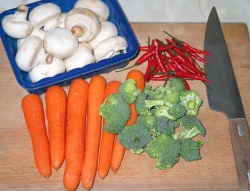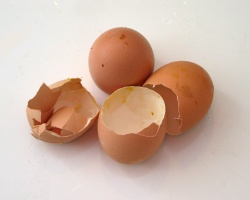What’s greener … to buy local non-organic veg or ship in organic veg from around the world?
 Most of the vegetable stalls at our local farmers’ market don’t advertise themselves as organic (possibly just because they’re not Soil Association-approved organic) – but most of the labelled organic veg in the supermarket has been shipped half way from Africa if not further afield.
Most of the vegetable stalls at our local farmers’ market don’t advertise themselves as organic (possibly just because they’re not Soil Association-approved organic) – but most of the labelled organic veg in the supermarket has been shipped half way from Africa if not further afield.
I suspect this is a better-for-self versus better-for-planet question but I’m not sure – since the pesticides etc on the non-organic veg are damaging the environment in countless different ways anyway.
We can’t always go to the wholefood/organic shops in the city centre that offer local, organic produce (albeit at a price) and my own organic garden veg are currently just seedlings being eaten by slugs, so what is the better alternative?
























I prefer to support my local farmers even if they’re not organic – because I think they’re more likely to go organic than supermarkets are to start buying locally – and the local farmer can’t survive if no one buys from them now.
Having said that, there are some things – like applies – that I always try to buy organic because of the amount of pesticides on the skins when they’re not organic. I’m lucky I can get both local and organic apples in my local box scheme – I think I’d be forced to organic ones from the supoermarket if I couldn’t.
Option C.
Grow it yourself.
Barring that… flip a coin each week. It’s pesticides versus carbon monoxide, etc.
I choose local over organic (but prefer both). I believe in the long run, for the environment and for society/community, it is best for each region to produce its own food. As Bev mentioned above, it is also more likely than local farmers will be persuaded to go organic by their local consumers.
It’s better to buy local, organic or otherwise, because global warming is a greater problem that pesticide use. That is, even if everyone has gone organic, if severe climate change takes place, organic or non organic will make little difference to the availability of food. But if you prevent severe climate change, you will still be able to ‘solve’ the pesticide problem at a later date. It’s kind of like a triage system – act to prevent or fix the problem that, if ignored, will stop you from acting to prevent or fix other problems.
Hmm….tough one. I guess you have to decide based on how far it’s come. I suppose a decider for me may be whether or not it is fairtrade, or if it’s a particular fruit/vegetable that absorbs a larger amount of pesticides – for example, pears take in a great deal , so I’d always buy organic for them.
This is less of a problem if you make an effort to eat seasonally, although sometimes that can be quite difficult without making huge sacrifices in what you eat. Some food is pretty much a staple, and you just have to buy whatever you can get (onions seem to be mostly from the other side of the world at the moment, for instance, and I use onions in virtually every meal I cook) whereas some food is more optional. So, for instance, unless you REALLY can’t live without pears, I don’t see why you need to regularly buy them out of season when there’s so many types of fruit available that can be grown closer to home during the rest of the year.
I’m not by any means suggesting you should give up eating anything not grown organically and within 20 miles of your home, obviously, but being a bit more aware and thinking “do I actually need this” when you’re thinking about buying apples from New Zealand or whatever. I’m no hair-shirt wearing holier-than-thou type, I must admit, I have occasionally bought the odd bunch of asparagus from Peru, or mangetout from Kenya, as a treat, but I would never buy stuff like that on a regular basis. And then there’s some things you can’t eat at all if you only ever buy local, seasonal, organic food, like bananas and many types of nuts. I get over the ethical dilemma by trying where possible to buy these types of things Fairtrade, so that my purchase is at least doing some good!
But the quick answer to the original question would probably be local. From the point of view of the “greater good”, agrochemicals are the lesser of two evils compared to the huge environmental impact of transporting food from half way around the world (and from a health point of view, although there could be health risks associated with long term exposure to the chemicals in conventionally grown food, local food will generally be fresher and therefore more nutritious).